- Home
- Melissa de la Cruz
Alex and Eliza--A Love Story Page 10
Alex and Eliza--A Love Story Read online
Page 10
Eliza pursed her lips together and shook her head in doubt.
“But that is not my point,” said Aunt Gertrude, speaking before Eliza could throw her off her game. “My point is, I know a swain when I see one. Colonel Hamilton is clearly smitten with you. And though he is handsome and intelligent—indeed, brilliant—perhaps even bound up in the very future of our young nation . . .” Here Aunt Gertrude’s shoulders slumped. “But I sense you find his suit unwelcome somehow?”
Eliza’s esteem for a woman who had forged such a singular role for herself—despite the expectations and constrictions of her gender was such that she could not lie to her. Nor could she bring herself to speak the truth, not least because she was not sure what the truth was. With facts, she was comfortable. Give Eliza Schuyler yards of fabric or pounds of mutton, and she could tell you exactly the yield of breeches or stew. But emotions were not the stuff of stitchery or recipes. She believed it was impossible to know what they would make until all the elements were right before her eyes.
“Unwelcome and quite impossible,” said Eliza stiffly. “And I doubt the veracity of his interest. I am sorry, Aunt. Colonel Hamilton is quite the catch, but he is not the fish for me.”
Her aunt regarded her in silence for a moment before turning back to her sewing. For a long moment there was nothing in the room besides the crackling of the fire and the rasp of thick thread pulled through coarse, sturdy cloth.
Then, almost under her breath, her aunt said, “Do not sell yourself short, Niece. You are the quarry and Colonel Hamilton the hunter, and I daresay if he cannot catch you, then he doesn’t deserve to claim you as his prize.”
12
Bold Moves
Ford Mansion: Continental Army Headquarters
Morristown, New Jersey
February 1780
Alex stared uncomprehendingly at the sheet of paper before him. Though he recognized his own hand, he had to remind himself to whom he’d just written. As the only member of General Washington’s staff who was fluent in French, Alex frequently wrote as many as twenty letters a day to French military commanders and the noblemen who paid for them.
The boulder Alex had to get around was General Washington’s famously terse directions. His Excellency, as Alex referred to the commander in chief with equal parts admiration and filial mockery, might say, “Tell La Bochambreaux to move his troops to Charlotte” or “Ask the Duke of Normandy for another 5,000 francs for the Georgia campaign.” Then leave it up to Alex to transform a half-dozen words into full pages of discours diplomatique, complete with flattery, appeals to one’s better nature, compliments to one’s children, wives, and mistresses, and cleverly veiled threats. No small task.
Though Benjamin Franklin was the official ambassador to France, credited with bringing the French into the war on the American side, it was Alex’s attentive and delicate correspondence that kept them in it. Despite the snail’s pace of the conflict and the absence of any immediate benefit to the French, the humiliation of the British was a goal the French needed little encouragement to embrace.
Alex looked down at the letter again to remind himself who would receive it. Ah! John Laurens—a lieutenant colonel in the Continental army currently serving in his home state of South Carolina. He was also Alex’s best friend.
“My dear Laurens,” he read, looking up guiltily to see if anyone could read over his shoulder.
The missive had begun formally enough with the latest military news, but halfway through his letter he veered off into personal matters. He had told Laurens about the handkerchief incident the years prior. Alex wanted to pursue the matter immediately, but John persuaded him to wait until General Schuyler’s trial was over, as Eliza would undoubtedly refuse any advances made by the man who was persecuting her father.
Alex noted the wisdom of his friend’s argument, although it took all of his self-control not to inundate Eliza with one love letter after another. But when he giddily told John that Eliza was coming to Morristown for the winter, John knew his dearest friend was smitten.
“The way I see it, Hamilton, is that it’s time to make a bold move.”
It was John who came up with the idea that Alex haunt the post road to intercept Eliza’s carriage, although not even he could have foreseen the broken wheel. It should have been a complete triumph. Instead Alex had ruined everything by revealing himself to be a rake and mortifying poor Eliza.
For over two years he’d pined for the spunky girl who’d put him in his place so deftly at her mother’s ball. Every moment from that evening stung as if it had happened last night—and he could not stop thinking about those laughing eyes, the biting wit. And as for the hours they spent on the ride to Morristown together, he could still feel her small waist in his hands, and her soft hair against his cheek, as well as recall the easy way she had bantered and parried with him. A chaste and sensible girl, with a good shape and a generous nature—qualities he had enumerated to Laurens years ago that he desired in a mate—and here now, he saw in Eliza. He found he liked her even more, knowing that she had never sent that note.
But was he a fool to think she might ever return his ardor?
After all, she had made her repulsion clear during their ride together, and had made it more clear when he visited the Cochrans’ residence and she didn’t want to see him. But Alex knew enough about the game of love to know that there was no surer way to make a fellow interested than to show no interest in him.
Was Eliza Schuyler rebuffing him to egg him on, or because she actually had no interest in him?
If he could see her again he could attempt to sound her out, if only she would allow him to call. Or perhaps he was chasing after an illusory El Dorado and should set his sights on a more realistic goal.
But that was the thing about Alex, a nameless orphan from the Caribbean, who had written his way up to General Washington’s side, he was nothing if not determined.
IT WAS SNOWING lightly when Alex turned up in front of the two-story white house on Chapel Street, a quarter mile down the road from His Excellency’s headquarters. The only light in the Cochran residence radiated from the good doctor’s study. Alex pulled up Hector outside the house to stare at the darkened second-floor bedroom. This was his self-imposed mission tonight—to keep guard duty in the shadows of the Cochran house, to watch for redcoats, of course, but in truth, to hopefully get a glimpse of Eliza’s figure if she happened to pass by the window, God willing.
He sat in his cavalry saddle, hidden from the road by a tree, keeping watch. He rubbed his gloved hands together for warmth, then leaned forward to give his loyal pal’s neck a good long scratching.
Hector was happy to be out for an easygoing moonlit stroll with his human and was feeling a bit spunky himself.
The snow stopped, and the blanket of clouds pulled away from the moon. From far off in a field behind the house came a whinny Hector recognized as decidedly feminine. The horse stamped his feet and tossed his head, half cantering in place with a lusty kick from his hindquarters. Alex’s hands were strong enough to steady him but he knew old Hector had a mind of his own.
“Easy, boy. Quiet down. Suppose somebody saw me out here. They’d think I was a ruffian—or worse, a lovesick lunatic.”
Every bit the good warhorse, Hector needed all of his willpower to hold himself together for his master. He gnashed his bit and stomped the snow under his hooves. Still, nature has a way of its own.
When a second sensuous whinny came floating through the air, Hector’s eyes flew open and he let out a bellowing neigh that would’ve woken the dead. Or certainly everyone in the Cochran household.
Light flooded the downstairs parlor as Dr. Cochran stepped out onto the front porch with a lantern. “Who’s there? Speak up, man! What business have you here?”
Alex froze. He’d been spotted. He eased his horse forward into the closest reach of the lamplight. Alex noti
ced a shadowy female form pass by the second-story window frame.
“Why, it’s Colonel Hamilton, is it not? What brings you out on such a bitter night?”
“Evening, Dr. Cochran. Not to worry you, sir, but there’s word of a ne’er-do-well highwayman out along the post road tonight; I thought it worth a trip to make sure you and the missus are safely protected. Is all well indeed in the Cochran household?”
Dr. Cochran looked around the empty yard. Quiet as ever. “We are safe, sir, and your concern is much obliged.”
Alex struggled to give off a serious air about tracking down this supposed ne’er-do-well, but his eyes had zeroed in on the second-floor bedroom where a candle flickered behind the lace curtain. The shadowy figure paused near the window and captured his complete attention.
“Well, it’s getting on a bit past my bedtime, young man. Will there be anything else you’re in need of tonight, Colonel?” the good doctor asked heartily, and Alex had a feeling Dr. Cochran could easily diagnose a case of lovesickness in a young soldier. “Ahem. Colonel?”
“What’s that? Oh yes. I mean, oh no—no, sir. That is, if you’re sure my services are not needed here, Doctor, I suppose I’ll be on my way.” Alex tipped his cap to the doctor and dug his spurs into Hector’s flanks.
“Good night, sir!”
“Good night to you, Colonel, and I’ll be sure and tell Elizabeth you stopped by to see her.”
The candle in the second-floor window went suddenly dark.
13
There Is No Inoculation Against Love
Continental Army Headquarters
Morristown, New Jersey
February 1780
“Well, Eliza, my dear,” Dr. Cochran noted the next morning, “you seem remarkably rejuvenated.”
Her symptoms did not indicate the onset of a cold, and after a second day in bed, Eliza was pronounced fit to resume her daily activities.
An elated Eliza asked if she could assist her aunt in administering smallpox inoculations to the soldiers in camp.
“That would be a fine thing, indeed,” agreed the doctor. Aunt Gertrude would appreciate her lovely niece’s enthusiasm. She had four hundred soldiers waiting to be inoculated and she could certainly use a second pair of hands.
“You know, dear, most of the troops are quite suspicious of this newfangled hoop-de-doodle and since you’ve already been inoculated and lived to tell the tale, you’re living proof that the treatment works!”
It was true. Eliza had been inoculated three years ago when General Washington ordered that all American troops should receive the treatment. Eliza recalled that when General Schuyler found out his troops were nervous about the procedure, he had taken it first, stepping up to demonstrate its safety. When doubts still prevailed among the men, he made a great show of instructing Dr. Cochran to administer it to the entire Schuyler clan.
Eliza had never seen such a battle of wills between her parents. Tough-minded Catherine Schuyler had squabbled with her husband over using their children as guinea pigs because of doubts of her own. After all, they had lost so many friends and family to the scourge of pox. But when the general convinced her that the treatment made it all but impossible that their beloved children would fall ill, not only had Catherine Schuyler consented, she volunteered to sit for the procedure, surrounded by all of her children. Eliza and her siblings were nervous, but they were more frightened of crossing their mother than contracting a disease. There was no choice but to grin and bear it for the sake of the troops.
Eliza was surprised to find the treatment was simple enough: The family received a scratch on the wrist and then the administration of the poultice. A rash and a light fever followed. Within a week the rash had flaked away and General Schuyler declared them all immune. Although it seemed to Eliza a remarkable scheme, she took her father’s words on faith.
Eliza actually found it to be a fascinating business, shrouded in a magical aura. The treatment materials were stored in a heavy wooden box fastened with an iron lock. Aunt Gertrude kept the key in a tiny velvet drawstring purse pinned at her side. The wooden box held a dozen tightly sealed glass bottles, each one filled with an innocuous off-white powder, coarser than flour but less granular than cornmeal. There were odd tools: a mortar and pestle fashioned from locust wood that had been cured into a rich brown finish; a spatula that looked a little like a fish knife; and the most fascinating of all, a good-sized silver fork, whose tines were bent at ninety degrees to the handle, so that it looked like a miniature rake.
Eliza took note of every step of the process. She watched Aunt Gertrude remove one bottle at a time, then immediately lock the box. She mixed a dram of powder with an equal amount of water and whirled it into a paste in the mortar, which was then scraped onto a bandage with the spatula.
Next came the application. Aunt Gertrude looked up at Eliza. “Now, here’s where you will come in most handy, so pay close attention. We begin first thing tomorrow, dear, so be sure to wear your layers. The enlisted men’s medical tent can get awfully drafty!”
“WHO’S NEXT?”
Aunt Gertrude nodded toward the long line snaking out of the tent. The men stood by with their shoulders slumped, smoking and telling jokes to ward off the creeping doubt they had about the mysterious goings-on.
“Bring along the next fellow, Eliza.”
Eliza treated all of the soldiers with the exact same can-do spirit. It amused her to see each soldier’s face switch from suspicion to surprise upon being greeted by a warm smile in the cold setting. As her aunt had predicted, Eliza’s presence made the procedure go much more smoothly.
“Take a seat, if you will, sir. Remove your jacket,” Eliza said over and over, “and roll up your sleeve.”
“Happy to, miss.” “Whatever you say, miss.” “Anything else, miss?” Each one of them seemed eager to oblige. Then it was time for Aunt Gertrude to go to work.
Once the soldier had his sleeve up, Aunt Gertrude took firm hold of his arm with one hand and drew the rake across his wrist with the other. She dragged it heavily, scoring sharp red welts in the skin, sometimes drawing blood before finally announcing, “This one’s ready for you now, Eliza. You may apply the poultice.”
At first, this was the only task Aunt Gertrude allowed her niece to handle. Somehow Eliza managed it with a gentleness that moved each one of the soldiers in her care. She folded the poultice over the wound and wrapped it in place, finishing it off with a soft squeeze before the soldier was sent on his way. Every man left the tent with a smile on his face instead of the worried look he’d stepped in with, believing that gentle squeeze was only for him.
But Eliza was a quick study and by the second day was every bit as capable of handling the entire procedure as Aunt Gertrude. Working in studied tandem, they performed the repetitive task twice as fast.
Each administration took no more than five minutes, but there were upward of four hundred men to treat. It took four full days, and a good part of the fifth, to get through them all.
Early in the afternoon of the fifth day, just as they were finishing up, a ginger-haired soldier poked his head inside the tent.
“Is it too late for one last soldier?”
Busy as they were, the women didn’t bother to look up. “Come in, come in,” Eliza said, sighing. Four hundred and one, she thought, but she would treat this soldier exactly like the hundreds of others she’d assisted over the last five days. “Take a seat if you will, sir. Remove your jacket and roll up your . . .” Eliza caught her breath as she turned.
“Happy to oblige, miss.” Colonel Hamilton shucked off his jacket and was making quite a show of busily rolling up his sleeve, showing off a well-muscled forearm. “And I must apologize for the lateness of my arrival.”
Aunt Gertrude didn’t hide her amusement. “Colonel, it is never too late to be at your service. We are all quite aware of your extraordinary
vigilance as to our family’s protection. As such, we are certainly bound to do all we possibly can for your well-being in return. Isn’t that right, Eliza dear?”
Eliza’s hand flew to her bonnet to tuck in a few stray tendrils of hair. “Yes, Auntie, of course. Quite right.”
She could barely maintain her composure. Without his military jacket on, Colonel Hamilton was so much more real to her than in her daydreams. She had forgotten how square and strong his shoulders were. And wasn’t that a fresh shaving cut on the swale of his jaw? Surely, the timing of this mission must’ve been carefully planned.
She avoided his gaze and it appeared he was doing the same, looking resolutely at the wall in front of him as Aunt Gertrude prepared the treatment. And the wily matron seemed to be taking her sweet time. When she’d mixed the paste and readied the spatula, she handed the application to Eliza and smiled. “Here we are, Eliza, will you do the honors?”
“I would be glad to, Auntie.”
“B-but . . . ,” Alex stammered, “I had assumed the good doctor’s wife would be doing this.” He showed his teeth in a nervous smile. “Are we quite sure Miss Schuyler, ah, well, that she knows what she’s doing?”
“Quite certain indeed, sir,” said Aunt Gertrude. “And I’m confident the two hundred troops who have already sat in this same chair for her would attest to it as well.”
“Well, if it’s good enough for my men, then I suppose it’s good enough for me, too.” Alex swallowed hard, his Adam’s apple playing along with his doubt.
“Ah, Colonel. Shall we say, ahem, this is not my first time in the . . . saddle. Now, if you’ll just give me your forearm and relax, it will all be done in no time at all.”
Unconvinced but steeling himself like the dutiful soldier he was, Alex extended his arm with a face full of misgiving.

 Gates of Paradise
Gates of Paradise Someone to Love
Someone to Love Pride and Prejudice and Mistletoe
Pride and Prejudice and Mistletoe Serpent's Kiss
Serpent's Kiss The Au Pairs
The Au Pairs Wolf Pact
Wolf Pact Witches 101: A Witches of East End Primer
Witches 101: A Witches of East End Primer Jealous?
Jealous? Cat's Meow
Cat's Meow Misguided Angel
Misguided Angel Birthday Vicious
Birthday Vicious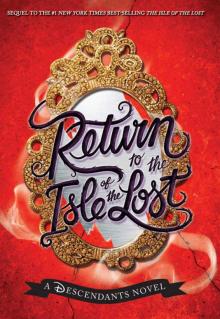 Return to the Isle of the Lost
Return to the Isle of the Lost Rise of the Isle of the Lost
Rise of the Isle of the Lost Angels on Sunset Boulevard
Angels on Sunset Boulevard Double Eclipse
Double Eclipse Blue Bloods
Blue Bloods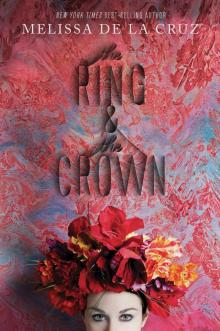 The Ring and the Crown
The Ring and the Crown The Ashleys
The Ashleys Les vampires de Manhattan
Les vampires de Manhattan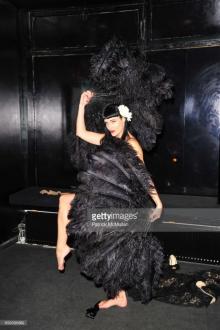 The Van Alen Legacy
The Van Alen Legacy Sun-Kissed
Sun-Kissed The Isle of the Lost
The Isle of the Lost Masquerade
Masquerade Witches of East End
Witches of East End Diary of the White Witch
Diary of the White Witch Crazy Hot
Crazy Hot Lost in Time
Lost in Time White Nights: A Vampires of Manhattan Novel
White Nights: A Vampires of Manhattan Novel Revelations
Revelations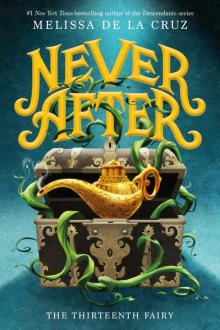 The Thirteenth Fairy
The Thirteenth Fairy The Birthday Girl
The Birthday Girl Lip Gloss Jungle
Lip Gloss Jungle Fresh Off the Boat
Fresh Off the Boat Something in Between
Something in Between Winds of Salem
Winds of Salem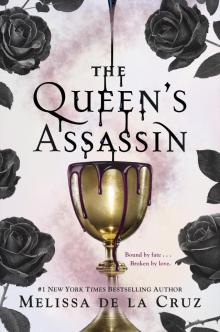 The Queen's Assassin
The Queen's Assassin Love & War
Love & War Social Order
Social Order Skinny Dipping
Skinny Dipping 29 Dates
29 Dates Popularity Takeover
Popularity Takeover Escape from the Isle of the Lost
Escape from the Isle of the Lost Beach Lane
Beach Lane Bloody Valentine
Bloody Valentine All for One
All for One Wolf Pact: A Wolf Pact Novel
Wolf Pact: A Wolf Pact Novel The au pairs skinny-dipping
The au pairs skinny-dipping Lip Gloss Jungle (Ashleys)
Lip Gloss Jungle (Ashleys) Crazy Hot (Au Pairs)
Crazy Hot (Au Pairs) Because I Was a Girl
Because I Was a Girl Blue Bloods 6 - Lost in Time
Blue Bloods 6 - Lost in Time Sun-kissed (Au Pairs, The)
Sun-kissed (Au Pairs, The) Bloody Valentine bb-6
Bloody Valentine bb-6 Golden
Golden Lost in Time_A Blue Bloods Novella
Lost in Time_A Blue Bloods Novella Alex and Eliza--A Love Story
Alex and Eliza--A Love Story Blue Bloods: Keys to the Repository
Blue Bloods: Keys to the Repository Birthday Vicious (The Ashleys, Book 3)
Birthday Vicious (The Ashleys, Book 3)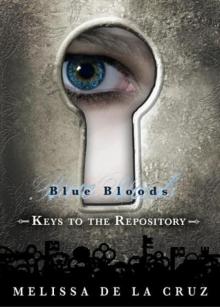 Keys to the Repository
Keys to the Repository Lost In Time (Blue Bloods Novel)
Lost In Time (Blue Bloods Novel) Stolen
Stolen Girls Who Like Boys Who Like Boys
Girls Who Like Boys Who Like Boys the au pairs crazy hot
the au pairs crazy hot Blue Bloods bb-1
Blue Bloods bb-1 Witches 101
Witches 101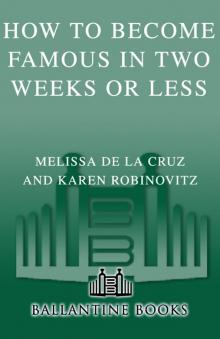 How to Become Famous in Two Weeks or Less
How to Become Famous in Two Weeks or Less Frozen hod-1
Frozen hod-1 Jealous? (The Ashleys, Book 2)
Jealous? (The Ashleys, Book 2) Misguided Angel (Blue Bloods)
Misguided Angel (Blue Bloods) Winds of Salem: A Witches of East End Novel
Winds of Salem: A Witches of East End Novel The Gates of Paradise
The Gates of Paradise Beach Lane Collection
Beach Lane Collection Wolf Pact, The Complete Saga
Wolf Pact, The Complete Saga Gates of Paradise, The (Blue Bloods Novel)
Gates of Paradise, The (Blue Bloods Novel) Vampires of Manhattan
Vampires of Manhattan Isle of the Lost
Isle of the Lost Love & War_An Alex & Eliza Story
Love & War_An Alex & Eliza Story The Ashley Project
The Ashley Project Love & War--An Alex & Eliza Story
Love & War--An Alex & Eliza Story